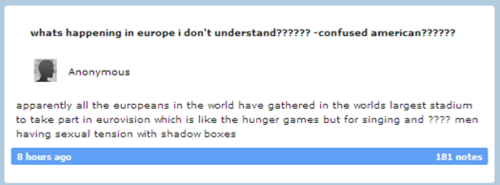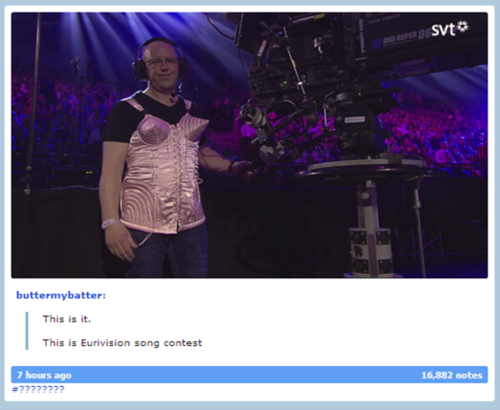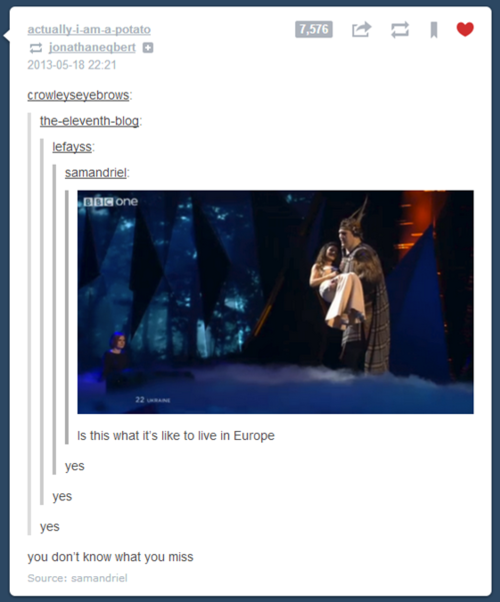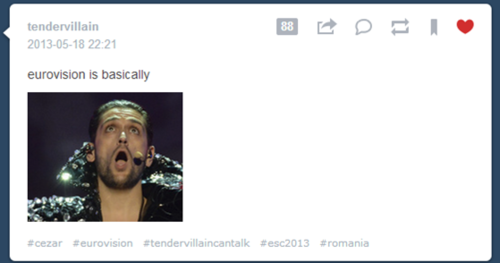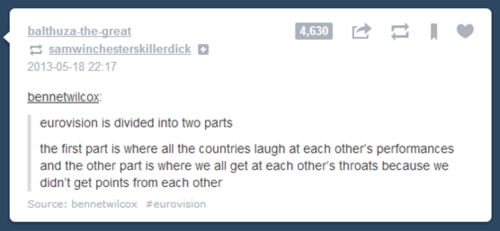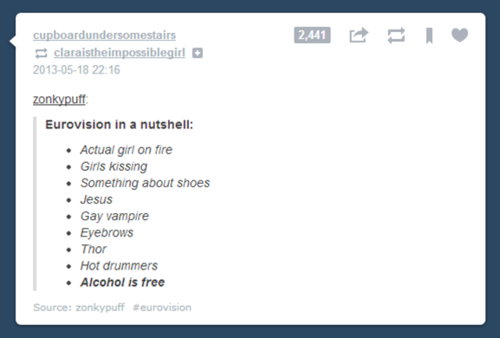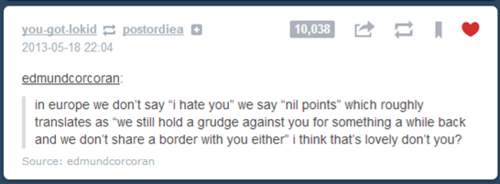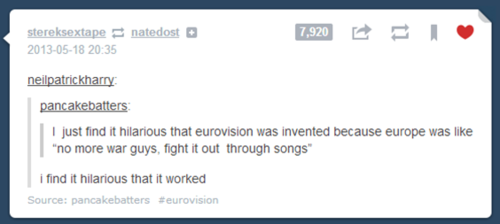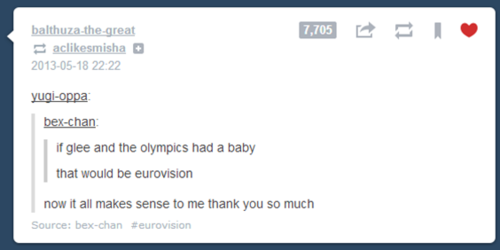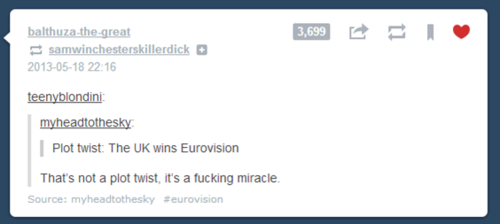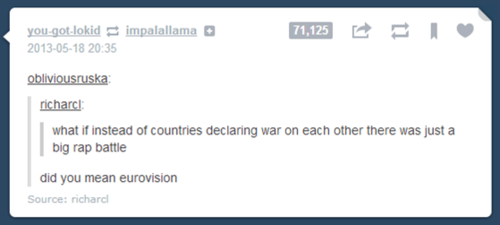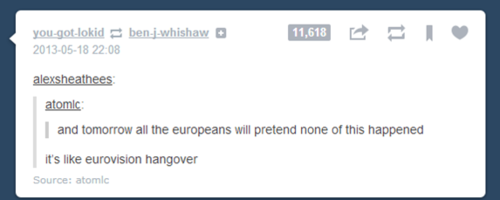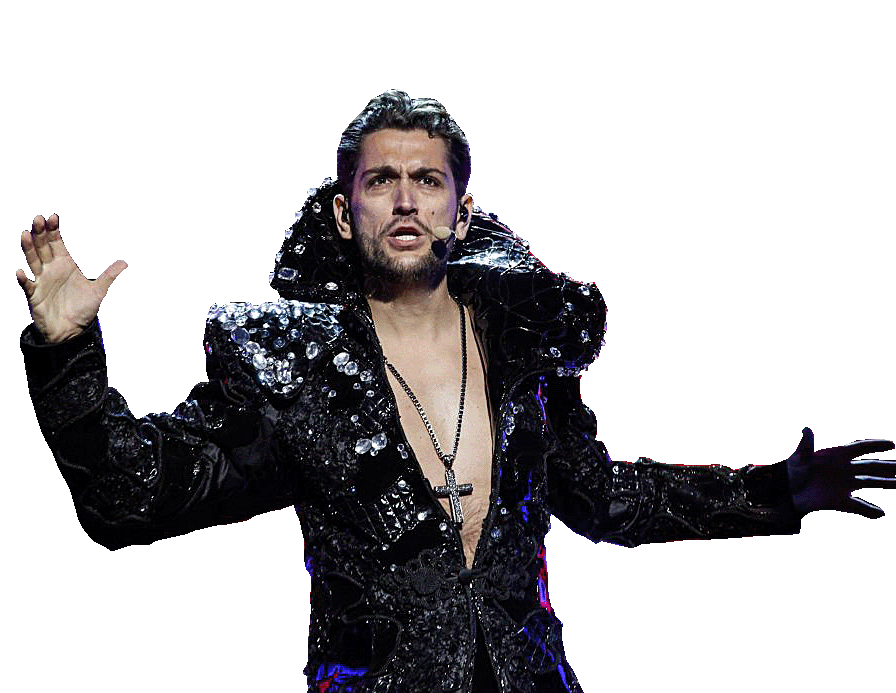You are using an out of date browser. It may not display this or other websites correctly.
You should upgrade or use an alternative browser.
You should upgrade or use an alternative browser.
Eurovision Song Contest!!
- Thread starter Fangu
- Start date
Lex
Administrator
I thought this article hit the nail on the head with Britain's attitude towards Eurovision:
For the past 10 years, the Eurovision Song Contest has provided a musical metaphor for Britain’s relationship with the European Union. We submit an appalling entry, chosen because we assume the continentals like trash. They don’t, and tend to give us nul points. We then assume we are victims of discrimination, that Eurovision is an exercise in continental intrigues that we wouldn’t want to win anyway.
But while Britain sneers, Eurovision has evolved into the world’s most popular and complex entertainment show, with the largest television audience of any non-sporting event. It has never been just about the music, and that’s the joy of it. Eurovision is a collision of power, politics, music and culture, and victory goes to those who best adjust for the fact.
At its heart lies the competition to produce the most powerful medium of all: a tune that somehow lodges itself in the back of heads from Reykjavik to Morocco. It is a battle that Britain could win every year – if we stopped to see what’s happening.
The key to understanding Britain’s failure at Eurovision is to understand its rules. Most countries have national competitions to decide their winners, and judge them on the performance and choreography as much as the music. Sweden now hires foreign juries, to give an outsiders’ view. This year, the foreigners actually overturned the verdict of the Swedes, which caused outrage for a couple of days. Tomorrow night, half of the Swedish population will be cheering on Robin, a Justin Bieber epigone whose entry reached No 1 in the Swedish charts. Britain’s entry – Bonnie Tyler – has not registered in our top 100.
The BBC controls our entry because it pays so much to the European Broadcasting Union. For this, we’re guaranteed a place in the final, to the fury of the other nations, who can see how little effort we put into it. Our entry is chosen by an anonymous BBC official, who evidently has a supercilious disregard for the whole show. The corporation is in many ways a national treasure and excels at news, drama, radio and documentaries, but it is baffled by popular culture. It has proven itself to be the Ukip of Eurovision, fielding candidates in a foreign contest that it holds up to ridicule.
There are complicated factors at play, and yet the BBC seems blind to them. The winning song needs to cut across the boundaries of 39 countries, with wildly different musical traditions. Eurovision is an annual search for a common currency – everyone wants to do a Lili Marlene. During the war, this tune was popular with troops on all sides, and has become one of the most enduring and evocative songs of the last century. The right Eurovision song can do this, smashing through political, cultural and linguistic boundaries. Abba’s Waterloo has lost none of its explosive power over the decades. Italy’s 1958 entry, Volare, is still sung all over the continent, wherever beer is served late enough.
Music is just the first level. The lyrics need to make some kind of sense to 60 million people who speak 32 languages. Or countries can score by going to the other extreme and exude ethnic pride. As the European people have lost interest in “ever closer union”, so Eurovision scores have tended to reward self-proud ethnic styles.
Ukraine’s Ruslana won in 2006 with a song that started with the trembitas, an alpine horn used by Hutsul shepherds. Level three lies in the political zeitgeist: the ability of a Eurovision entry to articulate the historical moment. It can be a girl from 1970 Londonderry or 1982 West Germany singing about peace. Finland’s entry is about gay marriage, hoping to capture the mood this year.
The Terry Wogan approach to Eurovision – that it is a parade of foreigners for us to laugh at – was entertaining but out of date long before he quit. Eurovision has mutated into a complex musical and political festival with a broader constituency embracing countries the EU is keeping at arm’s length. It is one of the few arenas where countries like Moldova and Armenia can be welcomed into the comity of Western nations. They tend to sing their hearts out as a result, and victory means the world. Ukraine’s Orange Revolution, a protest against the Kremlin’s enduring influence, came months after its Eurovision win.
A YouGov poll this week suggests 75 per cent of Brits blame our Eurovision defeats on a discriminatory block vote system. This is nonsense: we do badly because our songs are dreadful. Yet Britain exports music worldwide. Our artists accounted for one in every six records bought in France and Germany last year. Adele, Mumford and Sons and One Direction recorded four of America’s five best-selling albums.
Our nation’s musical talent is immense, and much of it as international as the contest itself. This sums up our European problem perfectly: on a people-to-people level, relations are great. But when you get institutions involved, it all turns sour.
We could win Eurovision every year, if we chose. We just need to try.
Elisa Maza
Whomst
When I find myself in times of trouble
Greece comes on to me
speaking words of wisdom
alcohol is free
Accurate!
Congrats to Denmark! And well done to our team for our position! Even though I think we deserved a higher one...

Flintlock
Pro Adventurer
So, 18th place won. I really am starting to think that the running order is one of the most important elements in determining the scores. Six of the last nine years have now been won from 17th-19th, and nine out of nine have been won from 17th-24th. Maybe I'll just start supporting numbers rather than countries from now on. Second place in particular needs some encouragement, as it's never won.
Perhaps I should look into the correlation further; it would be good statistics practice for me. A few more years of the current trend and Eurovision is going to need to give some serious thought to changing the competition's format.
As for the actual songs, I ended up rooting for Greece, but I was always pretty sure that Denmark would take it.
Perhaps I should look into the correlation further; it would be good statistics practice for me. A few more years of the current trend and Eurovision is going to need to give some serious thought to changing the competition's format.
As for the actual songs, I ended up rooting for Greece, but I was always pretty sure that Denmark would take it.
Last edited:
Fangu
Great Old One
Lex, that's a good article and pretty much says what we've been talking about lately. I don't believe the UK could win every year though; as the author says, winning ESC is complex. You need more than a good marketing system to win it (One Direction) and you only have 1 live performance to be judged on, and it needs to appeal to everything from drunk people to young crowds (Adele). It's not enough to be GOOD - look at what happened to Iceland this year.
Ruslana won in 2004 though, not 2006
Edit: Flint, you should rather do statistics on how many of the bookmaker's favorites has won over the past 10 years.
Ruslana won in 2004 though, not 2006

Edit: Flint, you should rather do statistics on how many of the bookmaker's favorites has won over the past 10 years.
Last edited:
Ami
Playing All The Stuff!
- AKA
- Amizon, Commander Shepard, Ellie, Rinoa Heartilly, Xena, Clara Oswald, Gamora, Lana Kane, Tifa Lockhart, Jodie Holmes, Chloe Price.
That article about our approach to Eurovision was spot on, Lex. I hate that the Beeb get to choose our entry pretty much every year. Bless Bonnie Tyler, she did come six places better than last year, but it'll never be good enough if we keep throwing out crap like this.
Octo
KULT OF KERMITU
- AKA
- Octo, Octorawk, Clarky Cat, Kissmammal2000
Yeah, it becomes a self fullfilling prophecy, the UK thinks Eurovision is a bit of a joke, so nobody wants to put too much effort into it, so nobody does and then we fail. Though I have to say I don't think Bonnie Tylers song was terrible, it was just a bit forgettable and 'safe'. I think she should have done something more in the vein of her 80's hits, bombastic with dry ice and lashings of hairspray.
I had no idea about the BBC thing though, I can see why that would annoy most voters.
I think they need to do some sort of X-factor style audition for it, only with people who write and perform their own songs - this would give them some sort of integrity.
I'm still confused as to why Ireland did so badly, I mean I didn't like the song myself, but I didn't think it was much worse or much different than any of the other dance based songs that did well
Oh and I guess its pointless saying it now but I think Norway should have won
I had no idea about the BBC thing though, I can see why that would annoy most voters.
I think they need to do some sort of X-factor style audition for it, only with people who write and perform their own songs - this would give them some sort of integrity.
I'm still confused as to why Ireland did so badly, I mean I didn't like the song myself, but I didn't think it was much worse or much different than any of the other dance based songs that did well

Oh and I guess its pointless saying it now but I think Norway should have won

Flintlock
Pro Adventurer
I'm not sure where I could find a list of the bookmakers' favourites for each year. Besides, the favourites often change in the run-up to a show; the favourite one week before the final might not be the same as the favourite after the semi-finals. I think they're pretty accurate, though, bookmakers. Probably because they look at things like the running orderEdit: Flint, you should rather do statistics on how many of the bookmaker's favorites has won over the past 10 years.

The BBC used to run a show like that. That's how you ended up selecting such illustrious talent as Daz Sampson and ScoochI think they need to do some sort of X-factor style audition for it, only with people who write and perform their own songs - this would give them some sort of integrity.
 I agree that the selection process should be transparent, but it doesn't guarantee results. It might also be unrealistic to expect all the participants to write their own songs; that's quite unusual for Eurovision. Alexander Rybak in 2009 was the last winner to have self-composed.
I agree that the selection process should be transparent, but it doesn't guarantee results. It might also be unrealistic to expect all the participants to write their own songs; that's quite unusual for Eurovision. Alexander Rybak in 2009 was the last winner to have self-composed.Fangu
Great Old One
The running order aren't decided until after the Semi's. Pretty sure you can find statistics fairly easy, all the big bookmakers have web sites, it's a huge dealI'm not sure where I could find a list of the bookmakers' favourites for each year. Besides, the favourites often change in the run-up to a show; the favourite one week before the final might not be the same as the favourite after the semi-finals. I think they're pretty accurate, though, bookmakers. Probably because they look at things like the running order

Flintlock
Pro Adventurer
I know, but bookmakers update their odds afterwards. Denmark's odds shortened dramatically and Finland dropped from 9th to 12th favourites on OddsChecker after the running order was decided.The running order aren't decided until after the Semi's.
I've been on a fair few betting websites and I've never seen a list of past odds. I know Betfair keep records, but you need to be an active customer to view them, and I'm not.Pretty sure you can find statistics fairly easy, all the big bookmakers have web sites, it's a huge deal
Unlucky
WHERE HAVE YOU BEEN
Oh and I guess its pointless saying it now but I think Norway should have won
Zomg, this ^ I can't decide which one is the better song but to me Norway's entry sticks out more.

Lex
Administrator
I wouldn't say Denmark didn't deserve to win but I was rooting for Norway too, definitely. I really wanted them to win too. Or even Ukraine, which I really liked. I'm still a bit miffed about Azerbaijan's high score. Their song wasn't awful and the staging was cool but I definitely don't think they deserved to score higher than Norway or a bunch of other countries.
Unlucky
WHERE HAVE YOU BEEN
^Amen. Actually my prediction was Norway to be at least top 2, if not the winner.
And performance-wise I'm not so impressed by Emmelie de Forest. She's sort of.. stiff. But maybe that's just because I'm comparing her to Loreen's performance last year.
Not to hate on Denmark though. I actually really like the song.
And performance-wise I'm not so impressed by Emmelie de Forest. She's sort of.. stiff. But maybe that's just because I'm comparing her to Loreen's performance last year.
Not to hate on Denmark though. I actually really like the song.
Splintered
unsavory tart
Fangu
Great Old One
fixxedI only saw the internet exploding but luckily some dude on the internet explained Eurovision to me from a British point of view
Unlucky, thanks for taking care of that, I agree, there can never be enough Cezar

Kuroto
Pro Adventurer
I wasn't too happy about Denmark winning this year to be honest. Actually it really started to annoy me in a way, partly because they were one of the few favourites and then they got the best position in the run-up. Though I wasn't too happy about the other two in the top three either. Especially the fact that Azerbaijan came second was a kind of wtf moment. I had rather see Norway win. I felt like Denmark's song was too much like a normal eurovision song, it wasn't really that special.
I voted for Italy this year. Sadly Finland didn't give any points to them though. Sometimes I think my attitude towards the entries is a bit weird. Like this year my favourite was Italy, but I had no expectations that the entry would win and I was perfectly happy that they came as high as 7th. But like I said I didn't like the fact that Denmark won at all. Luckily it's not that serious and I kinda know my annoyance towards Denmark is a bit irrational.
Sometimes I think my attitude towards the entries is a bit weird. Like this year my favourite was Italy, but I had no expectations that the entry would win and I was perfectly happy that they came as high as 7th. But like I said I didn't like the fact that Denmark won at all. Luckily it's not that serious and I kinda know my annoyance towards Denmark is a bit irrational.
I voted for Italy this year. Sadly Finland didn't give any points to them though.
 Sometimes I think my attitude towards the entries is a bit weird. Like this year my favourite was Italy, but I had no expectations that the entry would win and I was perfectly happy that they came as high as 7th. But like I said I didn't like the fact that Denmark won at all. Luckily it's not that serious and I kinda know my annoyance towards Denmark is a bit irrational.
Sometimes I think my attitude towards the entries is a bit weird. Like this year my favourite was Italy, but I had no expectations that the entry would win and I was perfectly happy that they came as high as 7th. But like I said I didn't like the fact that Denmark won at all. Luckily it's not that serious and I kinda know my annoyance towards Denmark is a bit irrational.Pixel
The Pixie King
Leigh Alexander wrote a really nice piece about Eurovision from the perspective of an american living in london.
http://boingboing.net/2013/05/20/eurovision-2013-an-american-i.html
http://boingboing.net/2013/05/20/eurovision-2013-an-american-i.html
Flintlock
Pro Adventurer
The results are in: in the last 20 years, a country's position in the running order has accounted for up to* 37% of its finishing position in the contest. I think that's quite a lot. Ideally, it would be 0%, and the quality of each song would be the only thing that determines how well it does.
I collated the results of the last twenty years of Eurovision contests in this spreadsheet. I then calculated the mean finishing position for each place in the running order. 22nd and 23rd had the joint-best medians, but I determined that 22nd was the better place, as it has the same number of wins, but more top three finishes and more top ten finishes. I then worked out the distance (absolute value) of each place in the running order from 22nd, and found that the correlation between that data and each place's median's ranking was 0.611. The square of that value, 0.373 (37%), is the proportion of the variance of the median finishing positions that can be explained by the running order.
Spreadsheet key
TopΔ: distance from the optimal place, 22nd. So 23rd = 21st = 1, 24th = 20th = 2, and so on.
High: best finishing position.
Low: worst finishing position.
Med: median finishing position.
Rnk: ranking of median finishing position - this was used for calculating the correlation.
Win: number of wins.
T3: number of top three finishes.
T10: number of top ten finishes.
Pts: treating each place in the running order as a Eurovision contestant, and treating each year as a voting country, I assigned 12 points for a win, 10 points for second place, then 8-7-6-5-4-3-2-1, just like Eurovision uses itself. This was just for fun.
Per: the mean number of "points" scored each year a place in the running order was used - some years had only 23 participants, so positions 24, 25 and 26 weren't used, for example.
Rnk2: ranking of "points" per year.
* Up to: correlation does not imply causation, as I'm sure everyone knows by now. It is possible that the same results would have been reproduced in each contest had their running orders been different. We're not able to run them again to find out, of course, but a correlation value over 0.6 does suggest that it's quite unlikely.
Spreadsheet key
TopΔ: distance from the optimal place, 22nd. So 23rd = 21st = 1, 24th = 20th = 2, and so on.
High: best finishing position.
Low: worst finishing position.
Med: median finishing position.
Rnk: ranking of median finishing position - this was used for calculating the correlation.
Win: number of wins.
T3: number of top three finishes.
T10: number of top ten finishes.
Pts: treating each place in the running order as a Eurovision contestant, and treating each year as a voting country, I assigned 12 points for a win, 10 points for second place, then 8-7-6-5-4-3-2-1, just like Eurovision uses itself. This was just for fun.
Per: the mean number of "points" scored each year a place in the running order was used - some years had only 23 participants, so positions 24, 25 and 26 weren't used, for example.
Rnk2: ranking of "points" per year.
* Up to: correlation does not imply causation, as I'm sure everyone knows by now. It is possible that the same results would have been reproduced in each contest had their running orders been different. We're not able to run them again to find out, of course, but a correlation value over 0.6 does suggest that it's quite unlikely.
Octo
KULT OF KERMITU
- AKA
- Octo, Octorawk, Clarky Cat, Kissmammal2000
I got a text from a friend that said: "Jafar looks good.".
Lol I was thinking of Ming the Merciless.
Fangu
Great Old One
^ Yep!
Two things:
* Some journalists in Lithuania are claiming they have proof two men part of an organized league traveled around several countries paying people to vote for Azerbaijan. ESC so far says they believe the proof is fake.
* Azerbaijan's dictator is now investigating why his country didn't give Russia any points.
lol ESC is some serious shit!
Two things:
* Some journalists in Lithuania are claiming they have proof two men part of an organized league traveled around several countries paying people to vote for Azerbaijan. ESC so far says they believe the proof is fake.
* Azerbaijan's dictator is now investigating why his country didn't give Russia any points.
lol ESC is some serious shit!
Unlucky
WHERE HAVE YOU BEEN
* Some journalists in Lithuania are claiming they have proof two men part of an organized league traveled around several countries paying people to vote for Azerbaijan. ESC so far says they believe the proof is fake.
Lol fake or not you have to wonder how this came up. It's like everyone knows they don't deserve the spot


